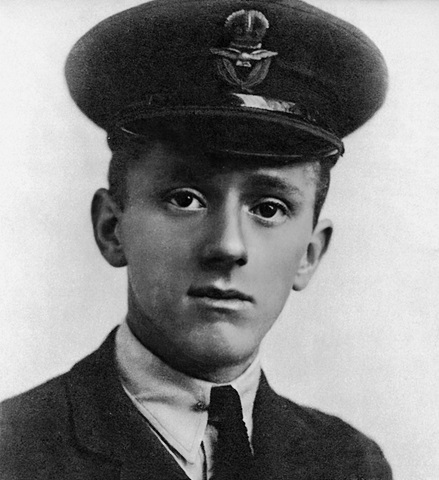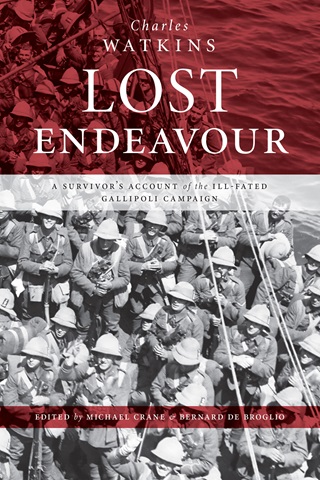From ‘fish-and-chip’ civilian soldier to hard-baked ‘old sweat’: Rochdale soldier’s memoir is a vivid account of the 1915 Gallipoli Campaign
Date published: 07 November 2023

Photo: Little Gully Publishing
Charles Watkins in 1918, having received his commission in the Royal Air Force
The remarkable memoir of a Rochdale soldier - Charles Watkins, who sailed for the Dardanelles with the 1/6th Battalion Lancashire Fusiliers in 1915 – has been published this month.
First published in 1970 for a ‘limited and private circulation’ before being reissued in 1982, Lost Endeavour gives readers an unvarnished view of the Gallipoli Campaign, a significant chapter in the annals of the British Army in the First World War.
For this modern, annotated edition, the editors, Michael Crane and Bernard de Broglio, have included a biography of Charles Watkins as well as detail on the 1/6th Lancs Fusiliers at Gallipoli — the battalion’s establishment, drafts and battle casualties, a timeline for May to December 1915, detailed maps of key battles, and a roll of honour.
Private 8878 Charles Watkins was born on 2 November 1895 and was the second of four children. A student at Rochdale Secondary School, he was able to stay on until he was 15 when he left to work at the Turner Brothers cotton mill.
At the age of 17, Charles volunteered for the Territorial Force, joining the Rochdale-based 1/6th Battalion Lancashire Fusiliers on 7 May 1913. He was one of many ‘Terriers’ to volunteer to serve overseas for the duration of the war, training in Egypt in 1914 with the East Lancashire Division (later the 42nd Division) before being sent to Gallipoli the following year.
Charles sailed for the Dardanelles with the 1/6th Battalion Lancashire Fusiliers in 1915. War, he said, was a welcome escape from hard labour in the mill: “I left school at the age of 15, to go and work in a foul Lancashire cotton mill, 12 hours a day.
“As a Territorial soldier (volunteer) I was mobilised at the outbreak of War One on August 4th 1914, and went abroad to the Middle East Theatre of war at once. So the war itself was for me, and for most of us, a deliverance from slavery, and as such was a welcome relief.”

view of the Gallipoli Campaign
The battalion lost 12 officers and 196 other ranks killed or died of wounds, and suffered, according to some estimates, between 700 and 800 wounded. They were evacuated from Gallipoli in the early hours of 29 December 1915, a fortnight before the final evacuation of the peninsula.
The battalion was sent, after a short period in Egypt, to the Western Front, but Watkins remained behind in Egypt, where he entered the Royal Flying Corps as an Air Mechanic 2nd Class. He also held positions as a 2nd Lieutenant (kite balloons) and an observer, which he described as “the most enjoyable time of the war - so much so that I could have wept when the war ended, for I loved the job so much.”
After World War One, Charles married and had four children. He lived in various parts of England after the war but returned to Rochdale to attend reunions. He died on 5 January 1989 at the age of 93.
Fifty years later, he wrote his memoir, a ‘hotch-potch of Gallipoli memories’: "I could give many plausible excuses for recording moments of this disastrous campaign, but the real truth is the selfish pleasure I find in recalling one crowded hour of glorious life. It was my very good fortune to serve with a Lancashire Territorial Division. To the memory of those contumacious, argumentative, sentimental and lovable Lancashire lads - ‘Salud’. No better comrades ever trod the field of battle…
"Students of military strategy and tactics had best throw this book away for they’ll learn nothing from it. In fact, I know even less of strategy and tactics than did the High-Ups who conducted the campaign. What’s more, a lowly private soldier sees very little of the larger picture of war - his own grubby little nose is always buried too deeply in his own particular patch of the dung-heap…"
The campaign is not short of operational histories, but few accounts get into the mind of the private soldier so successfully.
Private Watkins wrote: "The trouble is that most old soldiers develop a reluctance to talk - except perhaps after a few drinks, and when we seem, then, to get a little boastful and silly. At best, and when we are stone-sober, we feel we are merely a little boring to a new and unsympathetic generation.
"So we clam-up. We leave it to the cold, clinical dissection of historians to record the battles, the victories… and the defeats. The live and vivid experiences of the soldiers themselves are seldom, if ever, recorded - which is a pity, for without these how can the atmosphere of the times themselves ever be made to come to life."

© Ernest Brooks
Respected author and oral historian at the Imperial War Museum, Peter Hart, says: “Sometimes a personal experience book transcends its author’s occasionally wobbly memory and literary fancies. The writing can be so vivid that it opens a door to understanding ‘what it was like. Lost Endeavour by Charles Watkins does just that.
“It brings the life of a private soldier at Gallipoli into sharp focus — the unceasing danger and the terrible privations they endured day after day, week after week and month after month. In this, it is unbeatable.”
‘Lost Endeavour’ is published by Little Gully Publishing, and is available directly from the publishers or via Amazon (including as a Kindle e-book).
Do you have a story for us?
Let us know by emailing news@rochdaleonline.co.uk
All contact will be treated in confidence.
Most Viewed News Stories
- 1Rochdale born entrepreneur aims to take health platform stateside
- 2Toast of the town: Mayor of Rochdale celebrates 25 years at renowned bakery company
- 3Rochdale people could be charged for bins - and see a tax rise of 4.99% this year
- 4New chief executive appointed by Rochdale Council
- 5Castleton, Littleborough and Rochdale among stations to be served by Bee Network trains
To contact the Rochdale Online news desk, email news@rochdaleonline.co.uk or visit our news submission page.
To get the latest news on your desktop or mobile, follow Rochdale Online on Twitter and Facebook.

